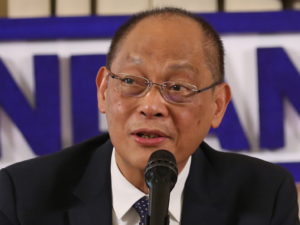MANILA, Philippines—The current commodity price spikes in the Philippines are not the type caused by economic expansion but by supply problems which do not merit monetary response, according to the head of the Bangko Sentral ng Pilipinas (BSP).
On Monday (March 29), BSP Governor Benjamin Diokno said the country is far from experiencing this phenomenon called “reflation”, since higher inflation seen in recent months were the result of a “transitory” mess in supply of a narrow range of agricultural products and an increase in oil prices worldwide.
“Reflation is the act of bringing inflation from very low levels back up to its long-term trend after a period of disinflation and economic downturn,” he said at an online briefing. “This is not the case.”
He explained that the current inflation uptick was expected to be temporary, and — as an inflation-targeting central bank — the BSP typically accommodates initial effects of supply shocks as these tend to be shortlived in nature.
Similar to previous supply shocks, non-monetary interventions, such as measures to moderate some food prices, remained the most appropriate response to the current inflation uptrend, he said.
At the same time, the BSP chief said the agency continues to watch for possible second-round effects from the ongoing supply shocks.
But the BSP sees a low probability of second-round effects because of ongoing underutilization of financial capacity and underemployment.
Diokno said that though it would be a delicate balance in the near term given the uptick in inflation, the decision to keep policy settings unchanged remained key to allowing previous monetary policy support measures to work their way through the economy as demand-based pressures on inflation remain largely subdued.
“BSP and national government policy responses continue to focus on closing the output gap, given the substantial excess capacity in the economy and the underemployment rate in the labor market,” he said, adding that the BSP’s monetary policy stance will continue to be supportive of domestic demand while the economy remains in its initial recovery phase.
“Over the medium term, as the economic recovery gains traction and becomes fully self-sustaining, the BSP will implement its well-crafted disengagement strategy for the unwinding of monetary policy stimulus, taking care to ensure the sustainability of recovery while also guarding against any emerging threats to the BSP’s price and financial stability objectives.” Diokno said.
TSB


